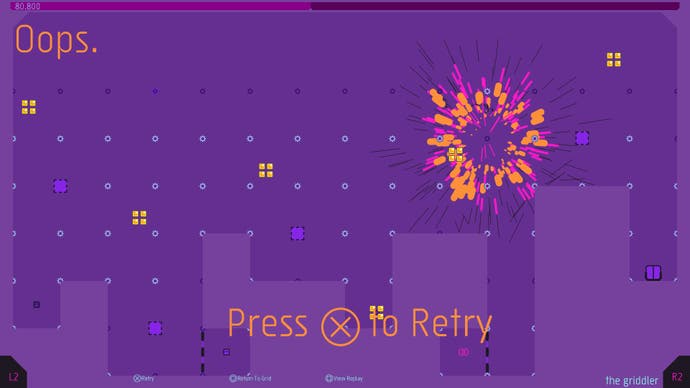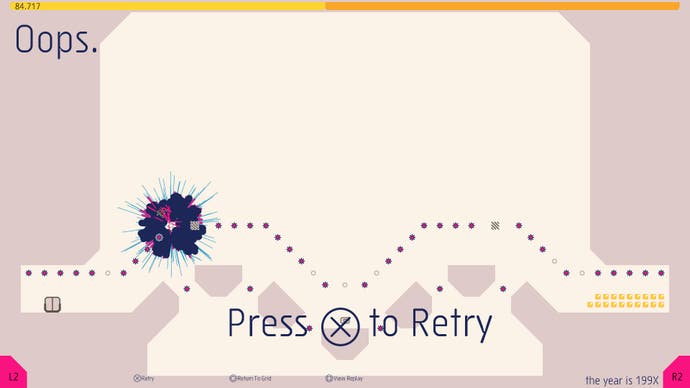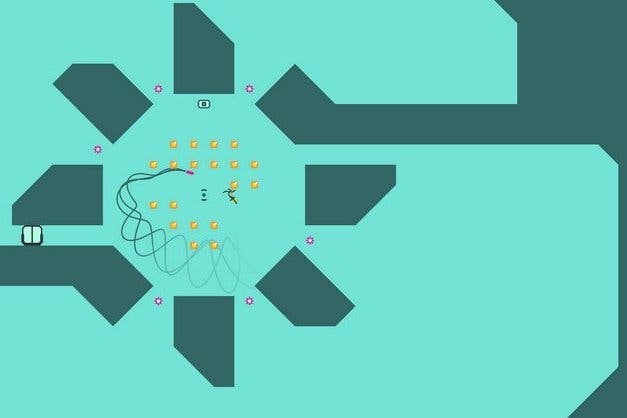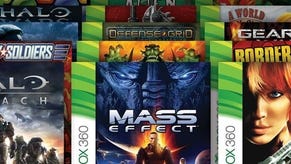N++ review
Ninjitsu-per.
It's not much of a life as an N++ ninja. Temporally speaking, as much as anything. A lack of height and surplus of speed has resulted in a bluebottle-like metabolism: your life expectancy is just 90 seconds. And that minute and a half is pretty grueling stuff. You can't afford to spare any microseconds on appreciating the finer things in life, luxuriating in a warm ninja bath, for example, or absentmindedly dipping a shuriken in a '47 Cheval Blanc. Nope, you have but one heroically single-minded ambition: "the need," as the game puts it, "to traverse a series of five rooms before the end of your lifetime." It's not all bad news though. Each of these rooms contains a glitter cannon spattering of gold pieces, every one of which increases your lifespan by two seconds - about 20 months in civilian years.
These rooms are, nevertheless, sparse and perilous. Each one has an exit door which must be unlocked by first finding and hitting its corresponding switch - usually located on the far side of the room, beyond some fearsome gauntlet. Obstacles come in various guises - spiked cogs, turrets that fire homing missiles, wibble-wobbling laser fields - and all kill instantly on touch. You have no tools at your disposal, apart from your raw athleticism: you can run, jump and use walls to slow your fall by sliding down to the ground. You must always be mindful of gravity: falls must be broken by landing first on a yielding slope; crash on flat ground from too great a distance and you'll tumble into a game over screen, all before you've had the chance to make much of your short yet noble life. Around this enviably small palette of interactions Metanet Software constructs a vast array of challenge rooms - more than 2000 in total, grouped into five-room sequences known as 'episodes'. For a game in which there's not much going on, there's an awful lot going on.

It's a game about spatial reasoning, but also about momentum. You soon learn that you accelerate more quickly on the ground than in the air (slightly contrary to expectation), and that vertical momentum accumulates. Wall jumping increases your upward momentum, as does running up an angled surface. Once you're through the first glut of episodes designed to teach and reinforce the basics, the majority of the more challenging stages involve the precision building and use of momentum, as you dash across tiny stretches of safe ground, leaping into the air and making micro-adjustments to your trajectory in order to land precisely where needed. There's a great deal more finesse than, say, Super Meat Boy, principally due to the subtle ways in which momentum is used to create challenge.
N++, like every well-streamlined twitch classic-in-waiting, keeps its story to a minimum, even going so far as to relegate its premise to a single page of text, accessed via a separate menu line item. Everything is designed to propel you and your character into the game with as much speed and as little friction as possible. The game's style pulls together with the UI and ninja himself to help create a sense of flow. A sparse, flickering, twilight trance soundtrack, plays uninterrupted between each episode, and a range of different colour palettes can be applied to the game via a dedicated and ever-present trigger-activated menu, allowing you to set the tone to match your mood. The drug-fuzzy aesthetic and the taut, sporty substance of the game create a curious and memorable mix. If you enter a flow state, it can be a long time before you emerge, disorientated, reinforced.

All clutter has been removed, to reduce the number of button presses that separate you from the next challenge - and there is always a next challenge. Episodes are grouped into three over-arching sections: 'Intro', a selection of 125 introductory rooms, 'N++', which has 500 more and 'Legacy', which offers the same number again. And despite the scale of the thing, the difficulty curve is elegant, and you barely notice the way in which you're learning and perfecting skills. It is, in other words, a substantial offering that will keep even the most single-minded twitch player busy for a long time before you even begin to consider the generous fistfuls of co-op stages for up to four players, and the race stages, in which you must fill the time meter as quickly as possible across the course of five stages by collecting gold fragments. A powerful and elegant editor opens yet more possibilities, and player creations can be simply titled and uploaded to the game's servers. For those looking to download amateur creations, the game intelligently filters new content, with options to view the 'Best', 'Newest' and 'Hardest' stages each week, as well as those created or tracked by friends.
You're scored on the time taken to complete each room, and whether or not you managed to collect every piece of gold in an episode, and these scores are immediately uploaded to the online leaderboards. While you can restart each individual map (either because you become stuck or if you want to retry it in order to either better your time or collect every piece of gold) you can't go back in the sequence once you've moved on, which can lead to mild frustration when you accidently click to proceed to the next stage when you meant to restart.
For some, there will be too much breadth and not enough depth here. This is not a game in which the avatar reports progress though sequential upgrades or unlocked abilities. You finish the game the owner of the same set of abilities with which you began. And yet, for those who persevere, change has nevertheless occurred on that journey. You progress from novice to master, not through filling on-screen gauges or harvesting abstract experience points, but through practice, dedication and determination. For those to whom this sort of journey appeals, the life of the N++ ninja, despite its brevity, will be profoundly rewarding.




